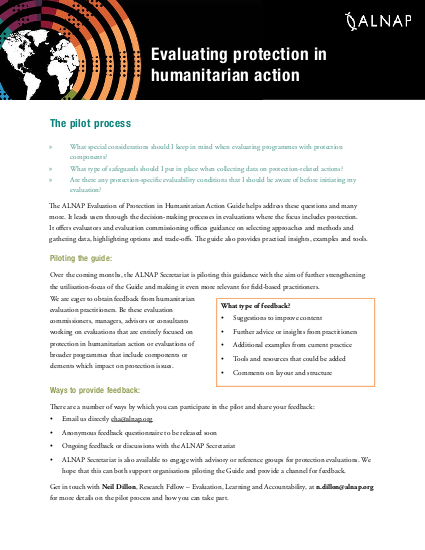
What special considerations should I keep in mind when evaluating programmes with protection components? What type of safeguards should I put in place when collecting data on protection-related actions? Are there any protection-specific evaluability conditions that I should be aware of before initiating my evaluation?
The ALNAP Evaluation of Protection in Humanitarian Action Guide helps address these questions and many more. It leads users through the decision-making processes in evaluations where the focus includes protection. It offers evaluators and evaluation commissioning offices guidance on selecting approaches and methods and gathering data, highlighting options and trade-offs. The guide also provides practical insights, examples and tools.
Piloting the guide:
Over the coming months, the ALNAP Secretariat is piloting this guidance with the aim of further strengthening the utilisation-focus of the Guide and making it even more relevant for field-based practitioners.
We are eager to obtain feedback from humanitarian evaluation practitioners. Be these evaluation commissioners, managers, advisors or consultants working on evaluations that are entirely focused on protection in humanitarian action or evaluations of broader programmes that include components or elements which impact on protection issues.
What type of feedback?
- Suggestions to improve content
- Further advice or insights from practitioners
- Additional examples from current practice
- Tools and resources that could be added
- Comments on layout and structure
Ways to provide feedback:
There are a number of ways by which you can participate in the pilot and share your feedback.
- Email us directly [email protected]
- Anonymous feedback questionnaire to be released soon
- Ongoing feedback or discussions with the ALNAP Secretariat
- ALNAP Secretariat is also available to engage with advisory or reference groups for protection evaluations. We hope that this can both support organisations piloting the Guide and provide a channel for feedback.
Get in touch with Neil Dillon, Research Fellow – Evaluation, Learning and Accountability, for more details on the pilot process and how you can take part.